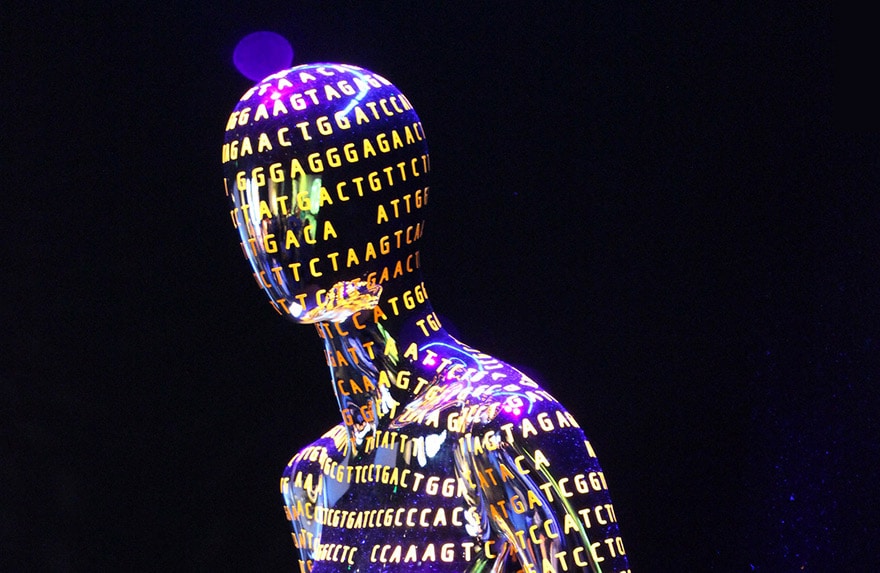(very present in Silicon Valley) where the only acceptable interventionism targets the biological human - any form of social engineering being denounced as an illegitimate and ineffective intrusion into the space of the individual's princely freedom. It is here, intellectually, that the
It is urgent to lift the veil and identify the political stakes - because the apolitical posture is not tenable - of a return to the organic. Behind the veneer of modernity that sublimates the biological argument by producing its version 3.0, we recognize an old debate. The question is that of the opposition, often radical, between the innate and the acquired, nature and culture. Will Biologism 3.0 be able to escape the excesses that marred its predecessor, the biologism of the turn of the 20th century?e century? For those who haven't forgotten the memory is bitter and painful and the question deserves to be asked.

Galton's eugenics in the United Kingdom, XIXᵉ century. Galton class eugenics
Pangloss or Huxley?
The biological turn is part of a broader evolution that reduces, while hardening it (in the sense of "hard science"), the scientific field. Despite the post-modern revolution, the methodological positivism has never been more conquerorious. It has become established in all scientific disciplines and is even impacting the humanities. The axiom is simple: everything can be measured and objectified, or rather everything that cannot be measured does not exist, so to speak.
This version 3.0 of biologism is therefore hyperscientific, based on the deep conviction that "To know is to measure." to quote the philosopher Leon Brunschvicg. Today we can "measure" human biology and thus "understand" human behaviour in all its dimensions - the necessary hypothesis being that nature and the innate are the explanatory factors of our behaviour and social structures.
Thus, genetics is being mobilized to explain theobesityor even thehomosexuality. Evolutionary psychology goes even further-using the genetic argument to justify an status quo (such as the low presence of women in science or a earnings differential affecting some groups more than others). L’endocrino-psychology is also making its way: hormone dosage, we are told, can explain (justify?) infidelity, sexual violence or crime. The argument is taken up in very serious management research publications - testosterone levels are used, for example, to explain infidelity, sexual violence or crime. accounting fraud.
More generally, neurosciences are becoming indispensable - they provide a grid for reading and comprehension but also increasingly legitimate levers for action and transformation through the strategic use of the neuronal plasticity. Thus, neuro-marketing promises a direct, scientific action on the consumer's brain in order to crave and therefore the purchase. Neurosciences should enable us to better manage our organizations by mobilizing the neural dynamics of motivation. They even promise the scientific recipe for happiness - by identifying rituals, such as brain gymnastics, that would stimulate the "circuits of happiness".
This offensive is surprisingly well articulated with the digital revolution and the progress of artificial intelligence. The biological human being is a "code" that our tools can today decipher almost completely (the sequencing of the human genome being symbolic here). Neuroscience promises us the mystery's end of the human brain and the possibility of direct intervention on the human code with the objective of "improvement". This promise is consistent with the promise of Singularity - an world of cyborgs where humans transcend biology by "growing" and machines "humanize" themselves by going beyond computational intelligence. But it can also be seen as a form of...eugenics 3.0 where the "work" of strategic selection would be done not at the level of populations but at the level of the genetic and neural material of each individual.
Biologism 3.0 is also intellectually compatible with the conception of human nature that underlies the dominant economic theory. A complete decoding of the human brain could allow us to identify those sticking points that explain why we do not behave as reasonable. Homo economicus. And this identification, coupled with gentle manipulation mechanisms (where neuronal plasticity and nudging combine) could represent a credible promise of finally achieving the Nirvana of neo-classical economics. All this corresponds to a world view libertarian (very present in Silicon Valley) where the only acceptable interventionism targets the biological human - any form of social engineering being denounced as an illegitimate and ineffective intrusion into the space of the individual's princely freedom. It is here, intellectually, that the The biological is back: in multiple forms (genes, hormones, neurons) it is everywhere as an explanatory variable of our behaviours but also as a manipulable mechanism for social transformation. This biologization of the world and of the social world affirms a dynamic of progress and mobilizes a scientific and apolitical discourse. In so doing, it is accompanied by a marginalization of alternative perspectives where the social, political or cultural context has a significant if not decisive impact on behavioural dynamics. There is an urgent need to lift the veil and identify the political stakes - because the apolitical posture is not a "political" one..
Scientific or ideological fight?
The intellectual construction that emerges from this rapid panorama is therefore powerful. First of all by its coherence. Man's "nature" explains his behaviour and the institutions he produces. The tools at our disposal will enable us to measure it, which, in this vision of the world, means understanding it. And by the way, we can envisage transforming it in order to make it compatible with three teleological projections that are being reinforced - the man-code, the man-god, the man-god and the man-god.Homo economicus. Powerful also in the sense of the power and resources behind it. GAFAM and Silicon Valley Ecology are directly carrying this agenda. The neoliberal networks of influence also recognize themselves in this revolution. Finally, the dominant economic theory and its disciplinary variants, which still structure the training of our elites, are appropriating Biologism 3.0 through the development of a neuro-economy and a neuro-management.
Beyond intellectual affinities, there is nothing like a common enemy to bind a coalition together. Here, a vision of the world inspired by the French Enlightenment - the equality of all human beings and the importance of context and background to understand the individual as well as society. Let's take a well-known example, that of sex and gender. The biologizing vision places gender at the heart of sexual biological markers when its alternative emphasizes the structuring impact of cultural (and therefore contextual) patterns in the construction of gender and gender relations. One could also evoke inequalities, reflecting innate, biological differences or, on the contrary, emerging from political, economic and social dynamics that can (must) be transformed.
Clearly, the debate is even more political than scientific. The champions of Biology 3.0 denounce the politics of their opponents but drape themselves in a posture of apolitical scientific modernity. The approach is clever. The starting argument is that of methodological positivism; the social sciences (and sociology in particular) are delegitimized because not "scientific" enough.. From there to deduce that they are political and ideological, there is only one step that is happily taken. We hear this argument among neuroscientists who justify their intervention on the school question by arguing that the cultural perspective is not scientific enough and therefore too political. We also hear it from some economists who defend the scientific purity of economics by denouncing the "economic negationism" carried by a culturalist perspective. On this altar, Pierre Bourdieu seems to be the perfect cleansing victim.
This assertion of a-politism is however untenable; the biological argument carries a conception of human nature that is also a political assertion. This argument, moreover, is in line with a rather disturbing genealogy. The Darwinian turning point in its Spencerian version is an early version of biology. Its excesses have legitimized racialist postures and measures - from the excesses of colonialism to Nazi horrors. The success of Spencerian ideas in the United States at the turn of the 20th century is less well known.e century among the captains of industry who were then building big business capitalism. In particular, the notion of survival of the fittest was a way to legitimize, by naturalizing it, the increase in inequalities. Andrew Carnegie, who went from being a "robber baron" to a "model philanthropist" within a few years... candidly explained how Spencer's discovery had changed his life: "All is well since all grows better" became my motto, my true source of comfort. »
After 1945, the Nazi horror, the end of colonialism and the feminist movement discredited the biological argument. It was kept quiet until the late 1970s. But as early as 1975, two books published by two homonymous Harvard professors clearly announced the return of biology. With Sociobiologythe biologist Edward O. Wilson was triggering a violent battle of ideas while paving the way for the work in evolutionary psychology that continues to gain influence today. In Thinking about Crimethe politician James Q. Wilson raised the question of the necessary evolution of public policies based on the principle that human nature is biological and non-changeable. Following on from this, Charles Murray and Richard Herrnstein published in 1994 The Bell CurveIn the case of the United States, the United Kingdom's National Council of Welfare (NCW), which has stated unequivocally that there are "insurmountable racial differences" that can be measured by IQ differences and that legitimize structural social and economic inequalities. The conclusion was that all forms of social and state interventionism were doomed to failure - what better scientific justification could there be for the withdrawal of the social state?
In 1975 and even in 1994, these texts triggered polemics. Twenty years later, Murray still says the same thing, but the zeitgeist has changed. Its argument is relayed by a dense network of think tanks and the biological argument has regained a place and a legitimacy that it once had.
The baby and the bath water
The debate on the innate and the acquired, nature and culture, is therefore far from over. And for the future of humanity it is undoubtedly desirable that it should never be closed. We are today in a phase of the cycle where the return of the organic is obvious, but the aim here is not to "throw the baby out with the bath water". Certain scientific advances in genetic medicine and neurobiology hold out the promise of major therapeutic breakthroughs. But the opening of the "biological box" is to be handled with care. Biological Engineering 3.0, which would reinvent the social and human through the manipulation of our individual biological data, could very quickly drift towards the most frightening of the "best of all worlds".
We must therefore mobilise to defend a productive and respectful debate between the champions of the innate and the decoders of the acquis and reject the temptation, palpable today, of a form of imperialism of biologising thought. The risk, if such a mobilization does not take place, of seeing old demons awaken is quite real and dizzying!
Marie-Laure Salles-DjelicShe is a University Professor at the Centre for the Sociology of Organizations and co-dean of the School of Management and Innovation, Sciences Po - USPC
The original text of this article was published on The ConversationUP' Magazine's editorial partner.
Anything to add? Say it as a comment.![]()












